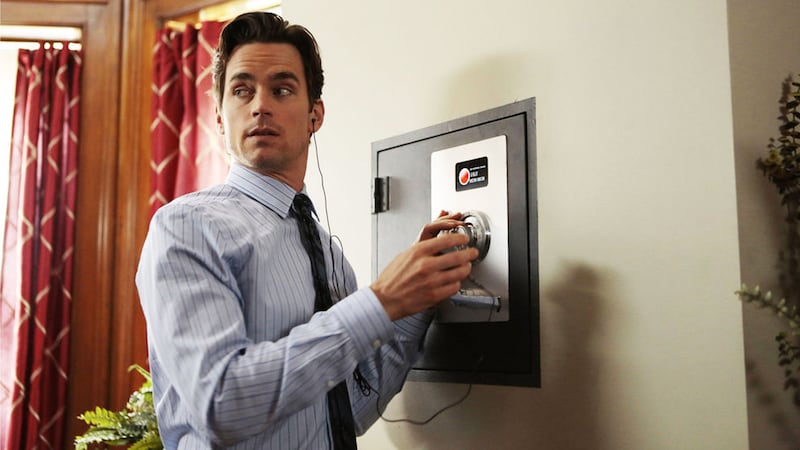Netflix knows how to get my attention. In its announcement that the series White Collar, which ran from 2009 to 2014 on USA, is now available on Netflix, the streamer posted on X that “it takes one episode for Matt Bomer to steal your heart in White Collar.”
The accompanying photo, a still from the show’s pilot, is of Bomer walking around shirtless in pajama pants. My heart, among other things, was duly stolen.
There’s good reason to pay attention to the White Collar Netflix launch, and it’s not just Bomer’s drool-worthy physique. Even though the show has been off the air for a decade, it’s poised to follow in the well-tailored footsteps of another USA drama series and become the biggest streaming show in the world. White Collar is basically about to become the next Suits.
If you recall, Suits was the most streamed show of 2023, a feat that seemingly came out of nowhere, inspired countless headlines and think pieces, and led to the show’s cast—save one duchess—revealed as presenters at the Golden Globes with the reverence of the living cast of All in the Family or MASH reuniting. While certainly successful when it aired, Suits was never a mainstream phenomenon or major awards player. So when it triumphed over series like The Crown or The Bear, or even other longtime streaming favorites like The Office or Friends, to become the year’s biggest streaming hit, it was quite a surprise.

Matt Bomer
USA NetworkBecause the entertainment industry has either never heard of or refuses to acknowledge the phrase “lightning never strikes twice,” Netflix is out there waving around metal rods in a thunderstorm. In bringing White Collar to the service, it could not be more blatantly saying, “We want everyone who watched Suits to watch this next.” And the thing is, it’s right: This has all the potential to be as big as Suits was.
I watched some of White Collar when it originally aired. I think. Who could say? That genre of show kind of blended together. Did I watch episodes of White Collar, or was I watching Suits? Maybe it was Burn Notice. Was it Graceland? I know I watched Graceland, because evidently I had an entire lunch at a diner with star Aaron Tveit to talk about it. But maybe I was actually watching White Collar instead. The jury is out.
There was a certain time period when USA had perfected this genre of TV series, and they all hewed so closely to a particular brand that they became somewhat indistinguishable. They were sleeker, sexier versions of the procedural drama that shows like Law & Order or The Practice had popularized on broadcast networks. The premise was very simple—handsome white man solves some sort of case—but there was a snarkiness and oh-so-tiny bit of edge that told the viewer, “We’re not a regular procedural, we’re a cool procedural,” bragging about being on cable instead of network TV as if they were the mom from Mean Girls.
The skies in these series were bluer. The fashion was more fashionable. The abs were… ab-ier, and frequently on display (thank god). But that was what made shows like Suits and White Collar appealing then. What makes people so insatiable for them now? It’s at the point that audiences are streaming them in record numbers, yet a show like this probably could not get greenlit by a cable network today.

Matt Bomer and Marsha Thomason
USA NetworkWhite Collar follows Bomer as Neal Caffrey, an infamous con artist who strikes a deal with the FBI agent who spent years pursuing him to work as a consultant in exchange for release. You’re immediately on board, because Caffrey didn’t commit violent crime; he committed rich, sexy crime—and because he happens to look like Matt Bomer. He has Odd Couple banter with Agent Peter Burke (Tim DeKay), who he partners with. The fraud schemes they investigate together are fascinating, because they are all of the white collar variety—hence the name of the show—and therefore more creative and whimsical than is typical of a procedural. And should your mind wander for a second, quick, there’s more abs!
But again, that’s what made people—ostensibly myself included, I think—watch then. The streaming phenomenon is a whole new ballgame. What’s been interesting about the last few years is that we’re a renaissance of procedural series on streaming. Some of them have long been canceled, like Suits or, now, White Collar. Some are currently airing series finding a new life on streamers that far outmatch their popularity on linear TV; series like The Rookie, 9-1-1, and Grey’s Anatomy rank among the top streaming series, while not coming close to topping the weekly ratings charts for new episodes.
It’s a second wave of the trend where, for so many years, popular sitcoms were the crown jewel of any streaming library. Anecdotally, I think the reason for these procedurals’ popularity is rooted in the same place: People are tired of having to make decisions, at least when it comes to TV. I think Shōgun is one of the best series of the year. But you know what I don’t want to do after having worked a gazillion hours, survived a gauntlet of Zoom meetings, and edited a million words of content? Sit down on the couch, put on the TV, and pull up the latest episode of Shōgun. It’s the same with Palm Royale, or Ripley, or any of the truly great series that are airing right now. Sometimes, greatness requires effort. Who has the energy for that?
It’s far more appealing to put on a show with beats that are so tried and true that you basically know what’s going to happen each episode, of which you can pay attention to only 30 percent while scrolling through Instagram, and that feels intangibly familiar.
After watching the first six episodes of White Collar on Netflix this week, there’s a reason that I can’t remember if I had seen them before or not: It doesn’t matter. That’s what makes these shows so beautiful; it doesn’t matter if you’ve watched them before. It doesn’t even matter if you pay attention to them while watching now. There’s a cozy familiarity and predictability to them—with an added side of abs—that is the perfect accompaniment for the thing I think we all need most these days: mindlessness. It’s the greatest treat of all in these ridiculously busy, exasperatingly stressful times, and shows like White Collar deliver just that.






